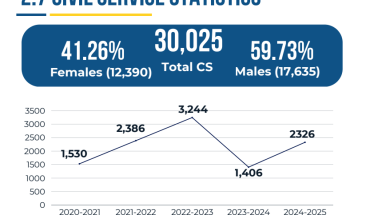
Report finds parents’ education level is key to their children’s academic success
TIL BDR GHALLEY | Thimphu
he National Education Assessment (NEA) 2024 has found that parental education particularly the father’s level of schooling plays a decisive role in shaping children’s academic performance.
The findings show that children of college-educated parents consistently outperform their peers across nearly all subjects, including English Reading Literacy, Mathematical Literacy, Dzongkha Literacy, and Scientific Literacy.
For Grade III students, the difference is particularly striking.
In English reading literacy, students with fathers who completed college scored 366 points, while those whose fathers had no formal schooling scored only 297 points a 69-point gap that researchers describe as both statistically significant and practically large.
A similar trend was evident in mathematical literacy, where children of college-educated fathers scored 347 points, compared with 296 points among those whose fathers never attended school.
The disparities were not limited to Grade III. Among Grade VI students, the pattern was even more pronounced across multiple domains.
Regression analysis undertaken by Bhutan Council for School Examinations and Assessment (BCSEA) confirmed that higher levels of father’s education were strongly associated with improved performance in English reading, English writing, Mathematics, and Scientific literacy.
Even when factors such as socio-economic background, language spoken at home, and access to early childhood care and development were controlled for, father’s education remained a significant predictor of achievement.
The NEA highlights that the impact of parental education extends beyond early schooling and into middle primary levels.
In Dzongkha literacy, however, the effect of parental education was somewhat less direct, with performance gaps smaller than those observed in English or Mathematics.
Nonetheless, students from families where parents were educated tended to fare better than those from uneducated households.
The broader context of family background also reinforced these trends.
Students from higher socio-economic status (SES) families—those with greater household income, assets, and occupational advantages outperformed their peers in most domains.
Language use at home played a further role, students who spoke English at home achieved higher scores in English Reading and Writing, while those who spoke Dzongkha or other languages at home performed better in Dzongkha Reading and Writing.
However, across all these factors, parental education remained one of the most powerful predictors of student success.
According to the BCSEA, the achievement gaps are not only statistically significant but also have real-world implications for equity in Bhutan’s education system.
“Students whose fathers had higher levels of education performed better in most cognitive domains compared to students whose fathers had lower levels of education,” the report states, underscoring the intergenerational benefits of education.
The NEA findings also stress caution in interpretation.
Since the survey is cross-sectional, the relationships between parental education and student performance are correlational, not causal.
However, the scale and consistency of the differences across domains and grades suggest that parents’ education levels have a substantial influence on learning outcomes.
For policymakers, the implications are clear. Expanding adult literacy and lifelong learning opportunities could help reduce educational inequalities in the long term.
The report recommends that students from families with less educated parents may need additional targeted support, such as remedial tutoring, school-based mentoring, and programs that encourage structured parental engagement in their children’s schooling.
The report also highlights the role of family engagement time, noting that students who spent more time in educational activities with their parents outperformed those who had limited family interaction.
This was particularly evident in Grade VI, where family support in reading and discussion correlated positively with better performance in English Reading, Dzongkha Reading, and Scientific Literacy.
The findings resonate with Bhutan’s broader vision of ensuring equity in education, aligning with the goals of Gross National Happiness and Sustainable Development Goal 4 on quality education.
They also emphasize the importance of breaking cycles of disadvantage by equipping today’s parents with the education and skills necessary to support the next generation of learners.
Ultimately, the NEA 2024 offers compelling evidence that education is not only transformative for individual students but also intergenerational in its impact.
Children benefit directly from parents who are educated, not just through improved economic circumstances, but also through enriched learning environments, better language exposure, and stronger academic support at home.
Parents with higher levels of education tend to provide supportive learning environments at home, invest in educational resources such as books and technology, and engage their children in discussions that nurture critical thinking.
Bhutan’s education system lacks continuity to address performance gaps rooted in socio-economic and family background factors.
Among them, parental education stands out as one of the most decisive influences on student achievement, pointing to the need for policies that empower families as much as schools.





